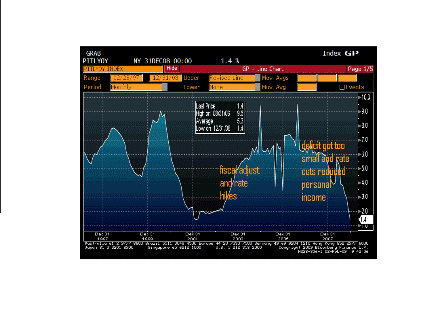(email exchange)
We’ll see if the SNB can borrow all the USD it needs without the Fed on an ongoing basis.
External debt like this is the stuff of most government financial blowups.
Low crude prices and falling US import demand are keeping USD ‘hard to get’ for the rest of the world that somehow got caught short USD, probably by funding USD assets that have declined in price.
Separately, attached is a graph of personal income that of course doesn’t ‘prove’ anything about the macro effect interest rates being the opposite of what CBs think it is.
Fed cuts have reduced government payments of interest to the non government sectors that remain net savers.
Fed ‘quantitative easing’ has also removed interest income from the non government sectors.
To paraphrase from a source I can’t recall where it was better stated, any more victories like these and we’ll be ruined.
>
> On Mon, Feb 2, 2009 at 9:20 AM, Mauer wrote:
>
> What do you make of this?
>
> BN 13:02 *SNB SAYS BILLS TO FINANCE TO UBS TOXIC ASSET FUND
> 1) BN 13:02 *SNB SAYS BILLS TO FINANCE TO UBS TOXIC ASSET FUND
> 2) BN 13:02 *SNB BILLS TO HAVE MATURITY OF LESS THAN YEAR
> 3) BN 13:02 *SNB TO ISSUE BILLS TO FINANCE LOAN TO SNB STABFUND
> 4) BN 13:02 *SNB SAYS DOLLAR BILLS ARE NEW MONETARY POLICY
> INSTRUMENT
> 5) BN 13:00 *SNB TO ISSUE DOLLAR-DENOMINATED SNB BILLS

Thanks!
Didn’t know that- much appreciated!
>
> On Mon, Feb 2, 2009 at 10:56 AM, J A wrote:
>
> Warren,
>
> You know that there is a classic paper by Ferguson and Epstein who provide
> archival evidence that it was the banks that convinced the Fed to reverse its
> quantitative easing and low interest rate policy because it was driving them
> bankrupt. All their commercial loans had defaulted and the only income
> learning assets they had were Treasury securities, so the lower rates went the
> lower their income and in the end they were having trouble covering operating
> costs, so they convinced the Fed to raise rates. Much like Greenspan giving the
> banks the yield curve to ride to generate income after the 1989-90 real estate
> bust.
>
[top]

